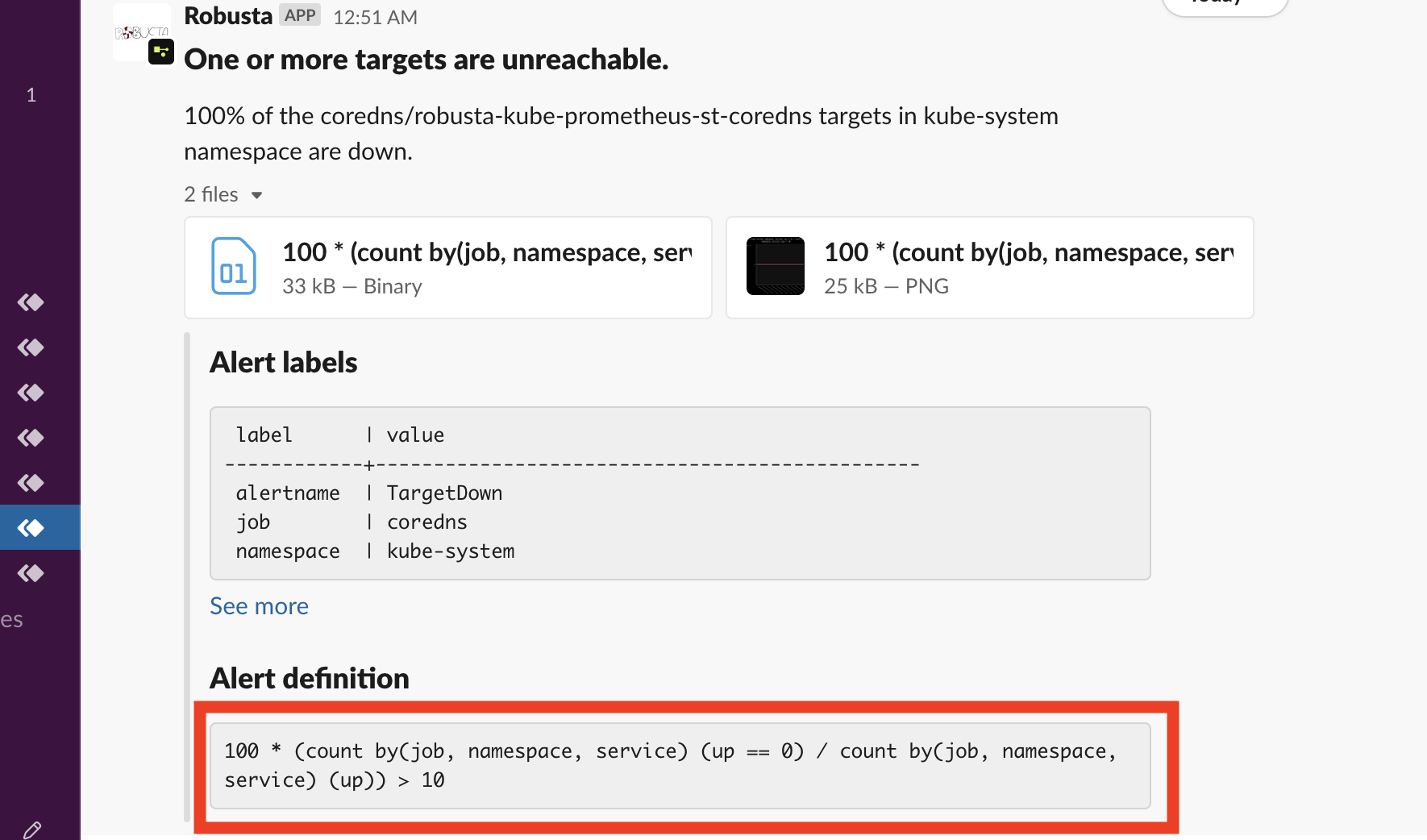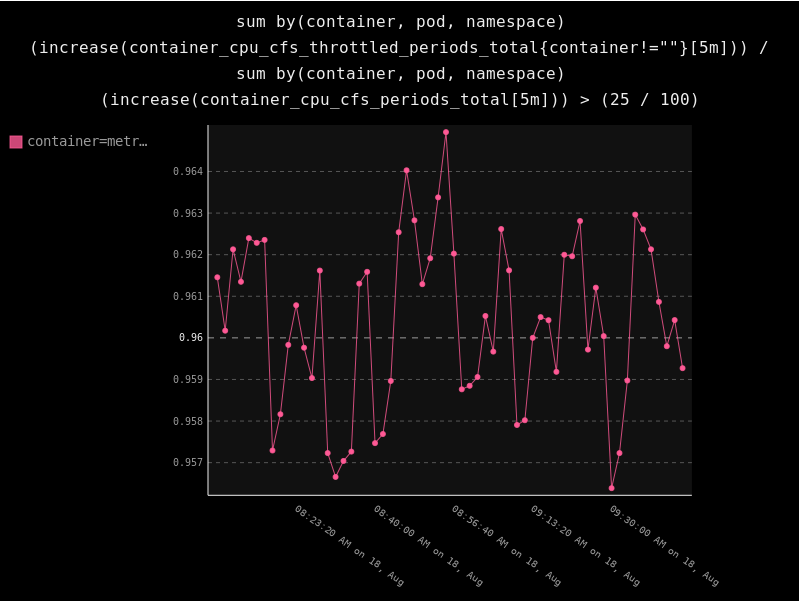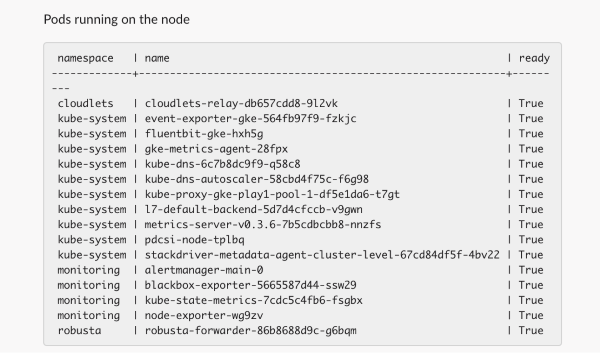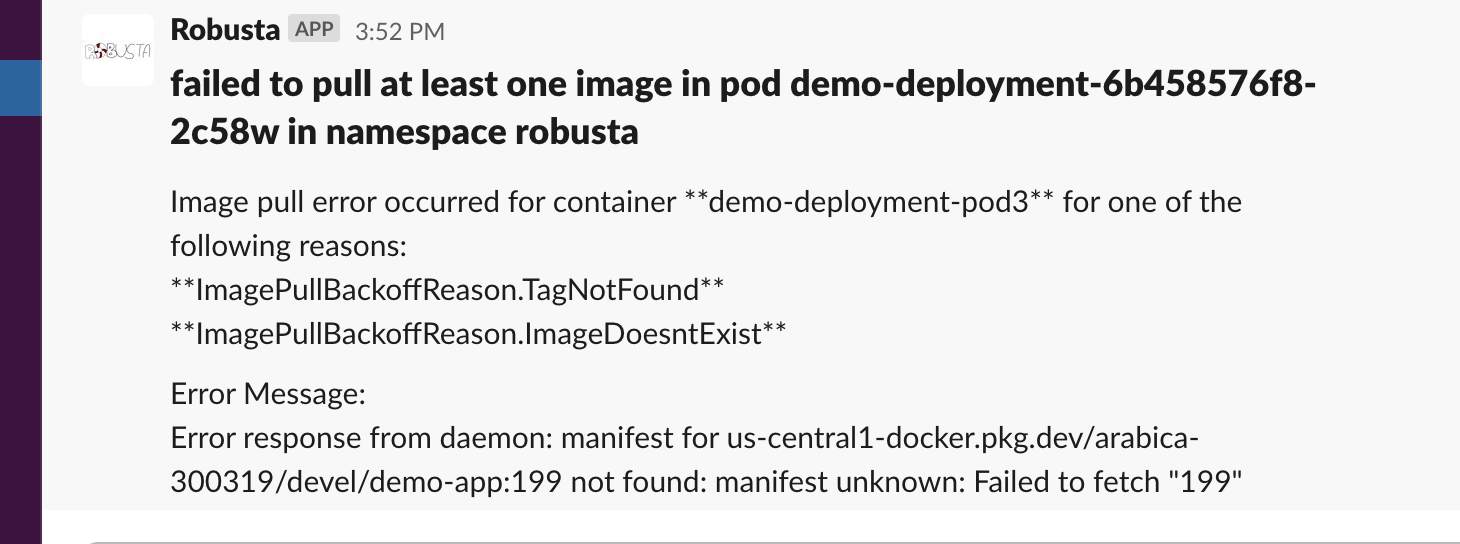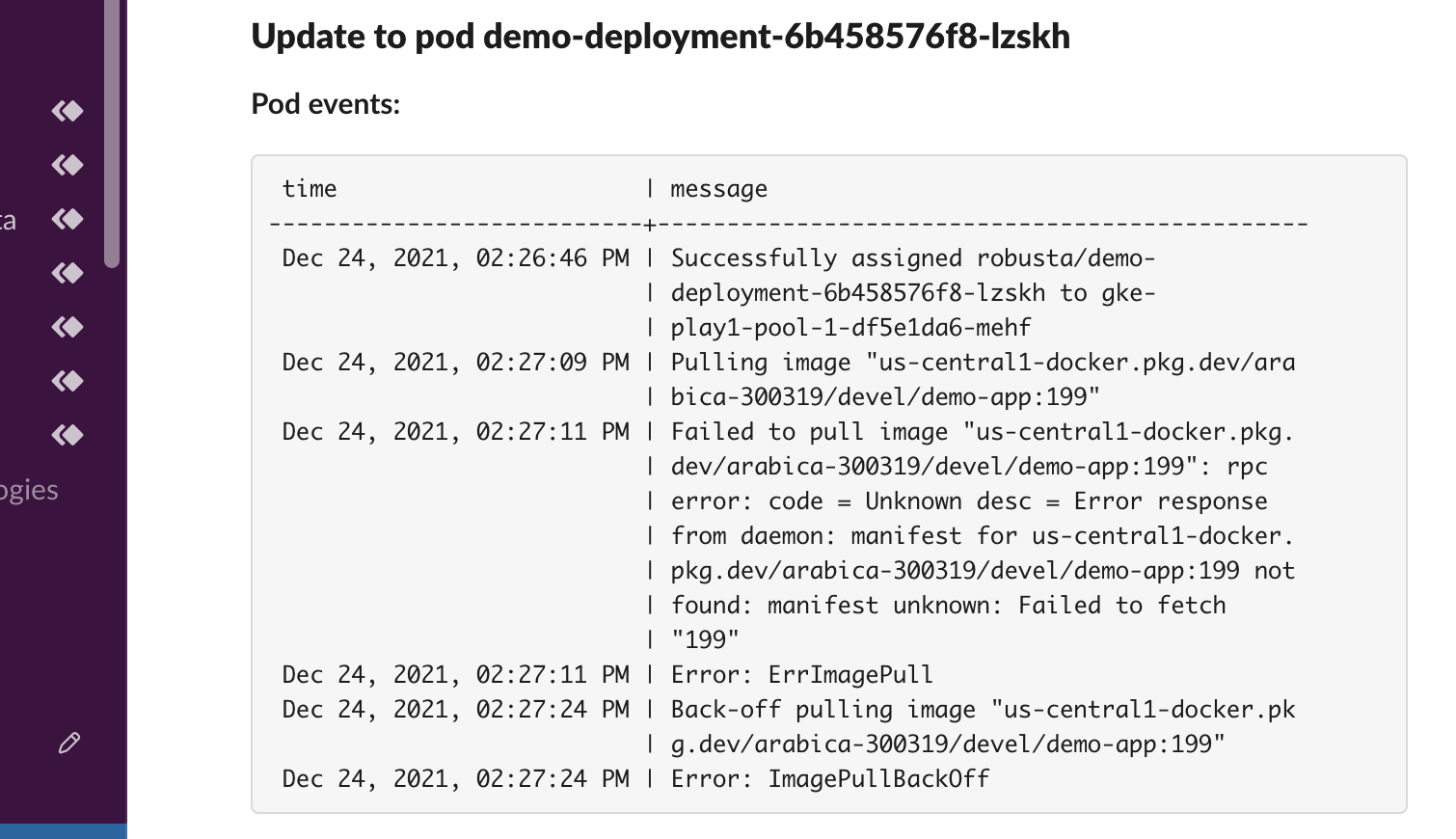Prometheus Alert Enrichment¶
Introduction¶
Robusta has special features for handling Prometheus alerts in Kubernetes clusters including:
Enrichers: actions that enrich alerts with extra information based on the alert type
Silencers: actions that silence noisy alerts using more advanced methods than Prometheus/AlertManager's builtin silencing feature
When trying out these features, you can leave your existing alerting Slack channel in place and add a new channel for Robusta's improved Prometheus alerts. This will let you compare Robusta's alerting with Prometheus' builtin alerting.
Each triggered action will add enrichment data to the finding. After all the triggered actions are executed, the findings and enrichments will be sent to the configured sinks.
Configure Robusta¶
Configure Prometheus AlertManager
Before you can enrich prometheus alerts, you must forward Prometheus alerts to Robusta by adding a webhook receiver to AlertsManager.
See Prometheus for details.
Lets look at the simplest possible configuration in values.yaml which instructs Robusta to forward Prometheus alerts without any special enrichment:
builtinPlaybooks:
- triggers:
- on_prometheus_alert: {}
actions:
- default_enricher: {}
The above configuration just forward prometheus alerts to the configured sinks. We didn't add any special enrichment yet. Below you can see how the default alert information looks in Slack:
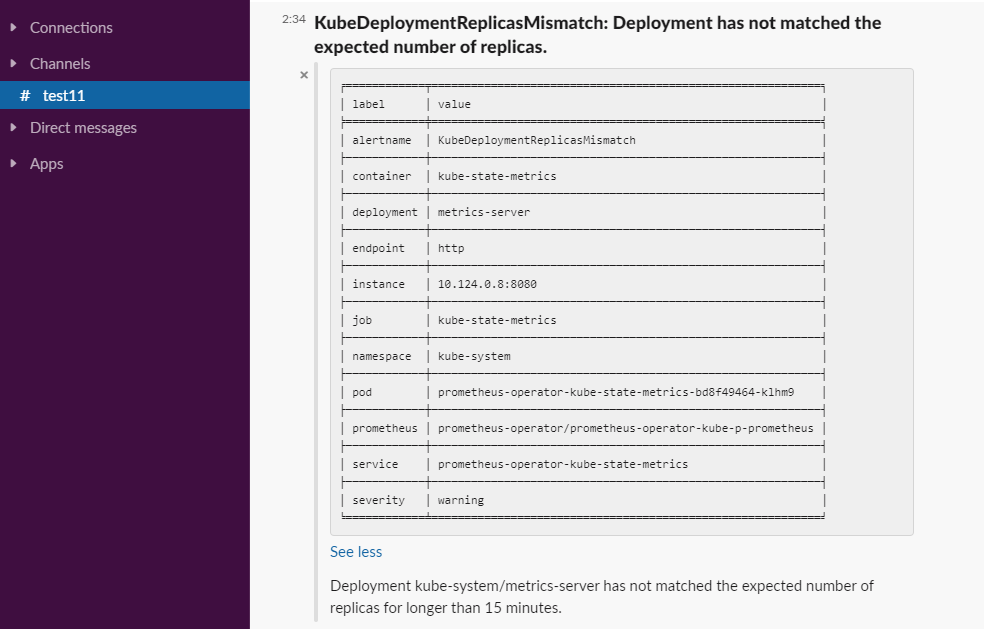
Adding an Enricher¶
Now lets add an enricher to values.yaml which enriches the HostHighCPULoad alert:
builtinPlaybooks:
- triggers:
- on_prometheus_alert:
alert_name: HostHighCpuLoad
actions:
- node_cpu_enricher: {}
- triggers:
- on_prometheus_alert: {}
actions:
- default_enricher: {}
When using the above yaml, all prometheus alerts are forwarded to the sinks unmodified except for the HostHighCPULoad
alert which is enriched as you can see below.
Note that adding an enricher to a specific alert, doesn't stop other enrichers from running. Enrichers will run by the order they appear in the values file.
It's highly recommended to always leave the default_enricher last, to add the default information to all alerts.
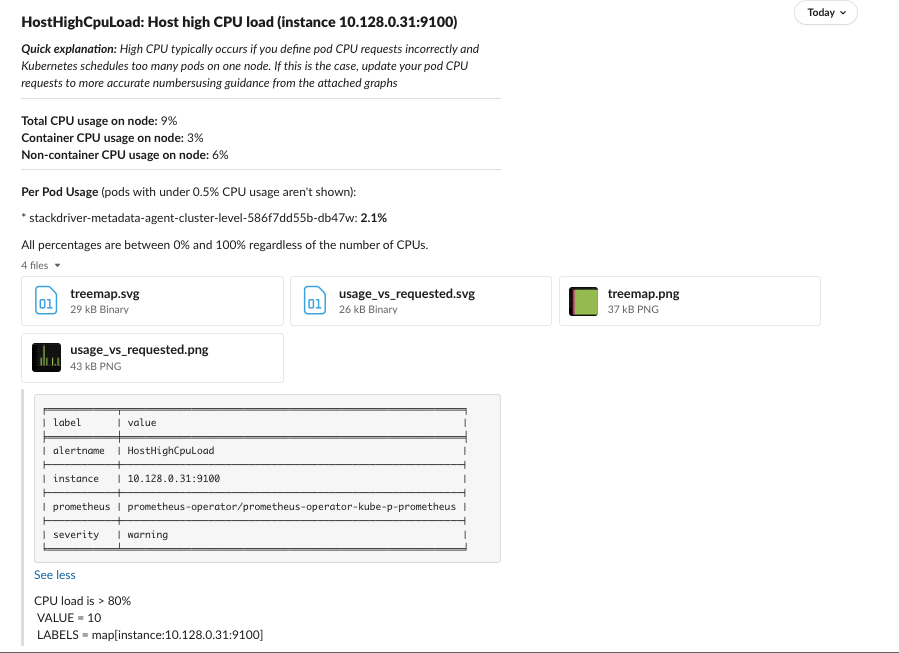
Make sure to check out the full list of enrichers to see what you can add.
If for some reason, you would like to stop processing after some enricher, you can use the stop playbook parameter:
builtinPlaybooks:
- triggers:
- on_prometheus_alert:
alert_name: HostHighCpuLoad
actions:
- node_cpu_enricher: {}
stop: True
- triggers:
- on_prometheus_alert: {}
actions:
- default_enricher: {}
Using this configuration, the HostHighCpuLoad alert, will not include the default alert information.
Adding a Silencer¶
Lets silence KubePodCrashLooping alerts in the first ten minutes after a node (re)starts:
builtinPlaybooks:
- triggers:
- on_prometheus_alert:
alert_name: KubePodCrashLooping
actions:
- node_restart_silencer:
post_restart_silence: 600 # seconds
- triggers:
- on_prometheus_alert: {}
actions:
- default_enricher: {}
Full example¶
Here are all the above features working together:
builtinPlaybooks:
- triggers:
- on_prometheus_alert:
alert_name: KubePodCrashLooping
actions:
- node_restart_silencer:
post_restart_silence: 600 # seconds
- triggers:
- on_prometheus_alert:
alert_name: HostHighCpuLoad
actions:
- node_cpu_enricher: {}
- triggers:
- on_prometheus_alert: {}
actions:
- default_enricher: {}
Available Enrichers¶
General Enrichers¶
Default enricher¶
Playbook Action
Enrich an alert finding with the original message and labels.
By default, this enricher is last in the processing order, so it will be added to all alerts, that aren't silenced.
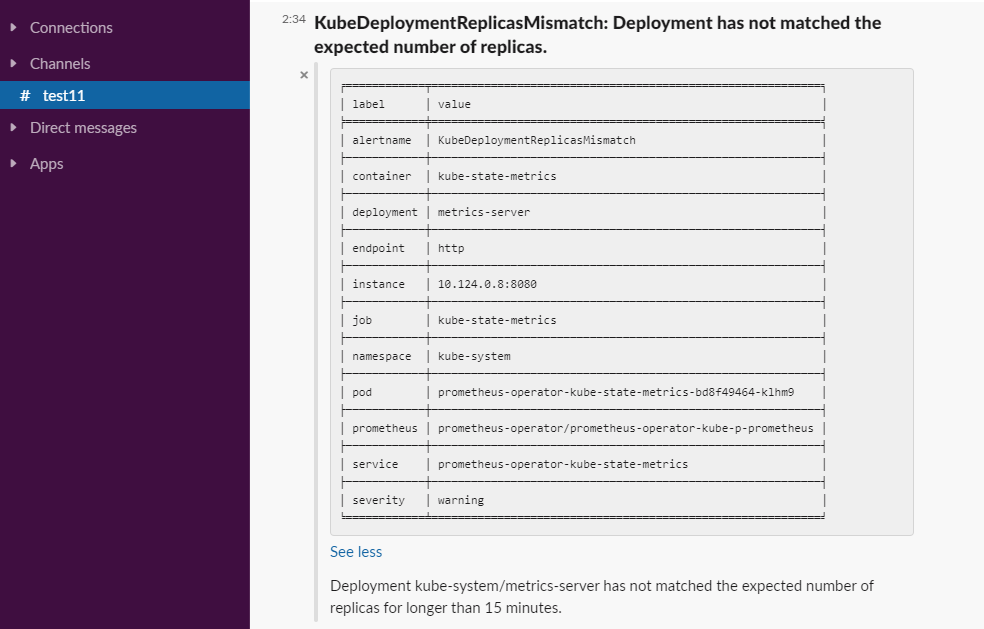
This action can be run automatically.
Add this to your Robusta configuration (values.yaml when installing with Helm):
actions:
- default_enricher: {}
triggers:
- on_prometheus_alert: {}
The above is an example. Try customizing the trigger and parameters.
No action parameters
on_prometheus_alert
Template enricher¶
Playbook Action
Enrich an alert finding with a paragraph to the alert’s description containing templated markdown. You can inject any of the alert’s Prometheus labels into the markdown.
A variable like $foo will be replaced by the value of the Prometheus label foo. If a label isn’t present then the text “<missing>” will be used instead.
Common variables to use are $alertname, $deployment, $namespace, and $node
The template can include all markdown directives supported by Slack. Note that Slack markdown links use a different format than GitHub.
This action can be run automatically.
Add this to your Robusta configuration (values.yaml when installing with Helm):
actions:
- template_enricher:
template: The alertname is $alertname and the pod is $pod
triggers:
- on_prometheus_alert: {}
The above is an example. Try customizing the trigger and parameters.
- template (str)
The enrichment templated markdown text
on_prometheus_alert
Logs enricher¶
Playbook Action
Enrich the alert finding with the pod logs, as a file. The pod to fetch logs for is determined by the alert’s pod label from Prometheus.
By default, if the alert has no pod this enricher will silently do nothing.
This action can be run automatically.
Add this to your Robusta configuration (values.yaml when installing with Helm):
actions:
- logs_enricher: {}
triggers:
- on_pod_all_changes: {}
The above is an example. Try customizing the trigger and parameters.
- warn_on_missing_label (bool)
Send a warning if the alert doesn't have a pod label
on_pod_create
on_pod_all_changes
on_pod_delete
on_prometheus_alert
on_pod_update
This action can be manually triggered using the Robusta CLI:
robusta playbooks trigger logs_enricher name=POD_NAME namespace=POD_NAMESPACE
Alert definition enricher¶
Playbook Action
This action can be run automatically.
Add this to your Robusta configuration (values.yaml when installing with Helm):
actions:
- alert_definition_enricher: {}
triggers:
- on_prometheus_alert: {}
The above is an example. Try customizing the trigger and parameters.
No action parameters
on_prometheus_alert
Graph enricher¶
Playbook Action
This action can be run automatically.
Add this to your Robusta configuration (values.yaml when installing with Helm):
actions:
- graph_enricher:
prometheus_url: http://prometheus-k8s.monitoring.svc.cluster.local:9090
triggers:
- on_prometheus_alert: {}
The above is an example. Try customizing the trigger and parameters.
- prometheus_url (str)
Prometheus url. If omitted, we will try to find a prometheus instance in the same cluster
on_prometheus_alert
Node Enrichers¶
Node cpu enricher¶
Playbook Action
Enrich the finding with analysis of the node's CPU usage. Collect information about pods running on this node, their CPU request configuration, their actual cpu usage etc. Provides insightful information regarding node high CPU usage.
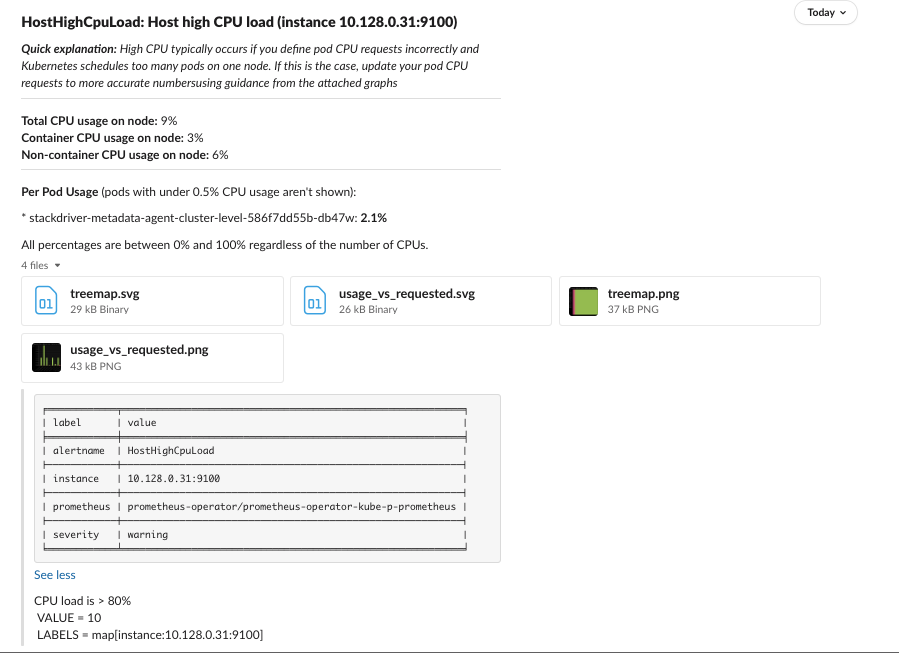
This action can be run automatically.
Add this to your Robusta configuration (values.yaml when installing with Helm):
actions:
- node_cpu_enricher:
prometheus_url: http://prometheus-k8s.monitoring.svc.cluster.local:9090
triggers:
- on_node_all_changes: {}
The above is an example. Try customizing the trigger and parameters.
- prometheus_url (str)
Prometheus url. If omitted, we will try to find a prometheus instance in the same cluster
on_node_create
on_node_delete
on_prometheus_alert
on_node_update
on_node_all_changes
This action can be manually triggered using the Robusta CLI:
robusta playbooks trigger node_cpu_enricher name=NODE_NAME
Oom killer enricher¶
Playbook Action
Enrich the finding information regarding node OOM killer.
Add the list of pods on this node that we're killed by the OOM killer.
This action can be run automatically.
Add this to your Robusta configuration (values.yaml when installing with Helm):
actions:
- oom_killer_enricher: {}
triggers:
- on_node_all_changes: {}
The above is an example. Try customizing the trigger and parameters.
No action parameters
on_node_create
on_node_delete
on_prometheus_alert
on_node_update
on_node_all_changes
This action can be manually triggered using the Robusta CLI:
robusta playbooks trigger oom_killer_enricher name=NODE_NAME
Node status enricher¶
Playbook Action
Enrich the finding with the node's status conditions.
Can help troubleshooting Node issues.
This action can be run automatically.
Add this to your Robusta configuration (values.yaml when installing with Helm):
actions:
- node_status_enricher: {}
triggers:
- on_node_all_changes: {}
The above is an example. Try customizing the trigger and parameters.
No action parameters
on_node_create
on_node_delete
on_prometheus_alert
on_node_update
on_node_all_changes
This action can be manually triggered using the Robusta CLI:
robusta playbooks trigger node_status_enricher name=NODE_NAME
Node running pods enricher¶
Playbook Action
This action can be run automatically.
Add this to your Robusta configuration (values.yaml when installing with Helm):
actions:
- node_running_pods_enricher: {}
triggers:
- on_node_all_changes: {}
The above is an example. Try customizing the trigger and parameters.
No action parameters
on_node_create
on_node_delete
on_prometheus_alert
on_node_update
on_node_all_changes
This action can be manually triggered using the Robusta CLI:
robusta playbooks trigger node_running_pods_enricher name=NODE_NAME
Node allocatable resources enricher¶
Playbook Action
Enrich the finding with the node resources available for allocation.
Can help troubleshooting node issues.

This action can be run automatically.
Add this to your Robusta configuration (values.yaml when installing with Helm):
actions:
- node_allocatable_resources_enricher: {}
triggers:
- on_node_all_changes: {}
The above is an example. Try customizing the trigger and parameters.
No action parameters
on_node_create
on_node_delete
on_prometheus_alert
on_node_update
on_node_all_changes
This action can be manually triggered using the Robusta CLI:
robusta playbooks trigger node_allocatable_resources_enricher name=NODE_NAME
Node bash enricher¶
Playbook Action
Execute the specified bash command on the target node. Enrich the finding with the command results.
This action can be run automatically.
Add this to your Robusta configuration (values.yaml when installing with Helm):
actions:
- node_bash_enricher:
bash_command: ls -l /etc/data/db
triggers:
- on_node_all_changes: {}
The above is an example. Try customizing the trigger and parameters.
- bash_command (str)
Bash command to execute on the target.
on_node_create
on_node_delete
on_prometheus_alert
on_node_update
on_node_all_changes
This action can be manually triggered using the Robusta CLI:
robusta playbooks trigger node_bash_enricher name=NODE_NAME bash_command=BASH_COMMAND
Pod Enrichers¶
Pod bash enricher¶
Playbook Action
This action can be run automatically.
Add this to your Robusta configuration (values.yaml when installing with Helm):
actions:
- pod_bash_enricher:
bash_command: ls -l /etc/data/db
triggers:
- on_pod_all_changes: {}
The above is an example. Try customizing the trigger and parameters.
- bash_command (str)
Bash command to execute on the target.
on_pod_create
on_pod_all_changes
on_pod_delete
on_prometheus_alert
on_pod_update
This action can be manually triggered using the Robusta CLI:
robusta playbooks trigger pod_bash_enricher name=POD_NAME namespace=POD_NAMESPACE bash_command=BASH_COMMAND
Cpu throttling analysis enricher¶
Playbook Action
Enrich the finding with a deep analysis for the cause of the CPU throttling.
Includes recommendations for the identified cause.
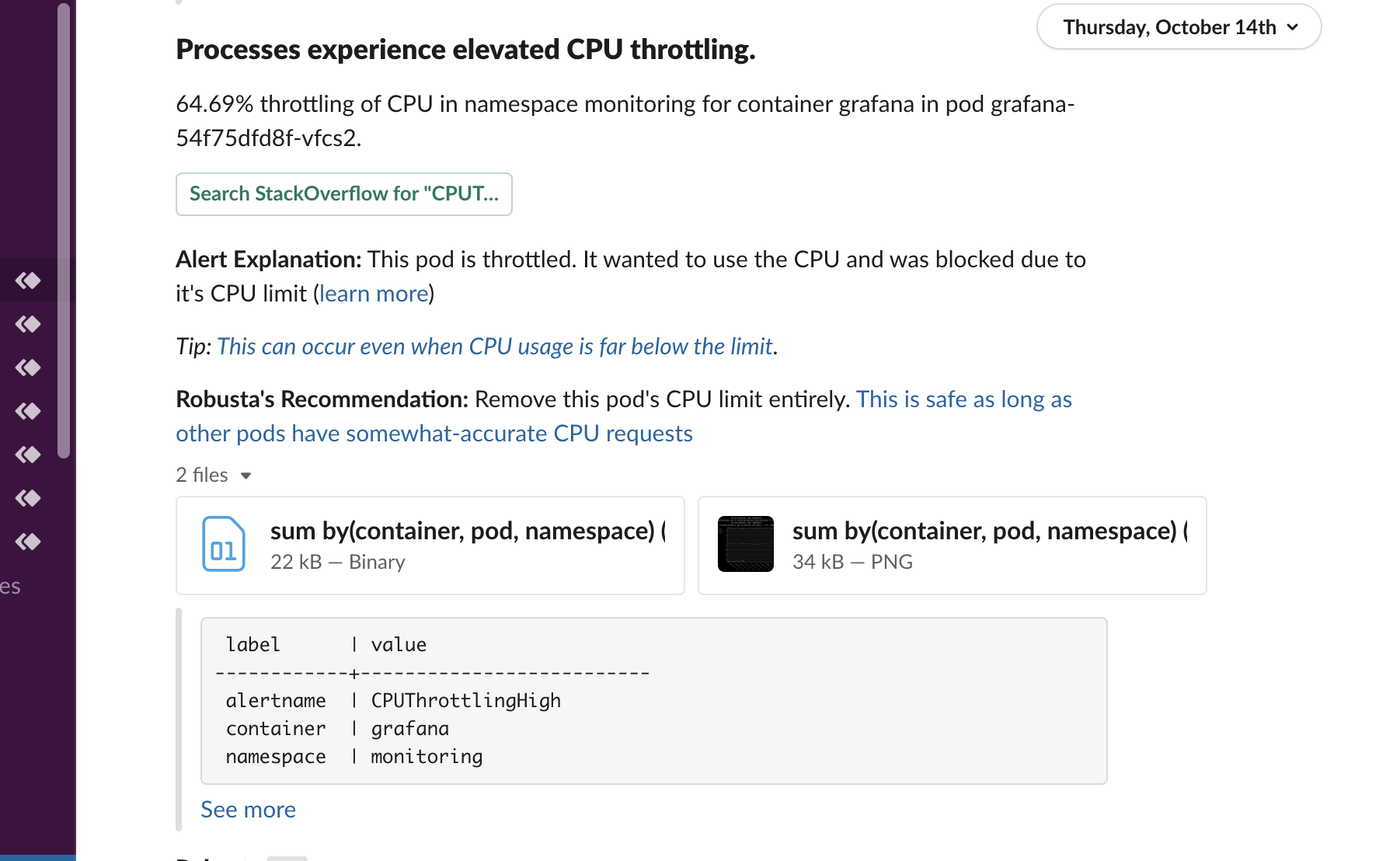
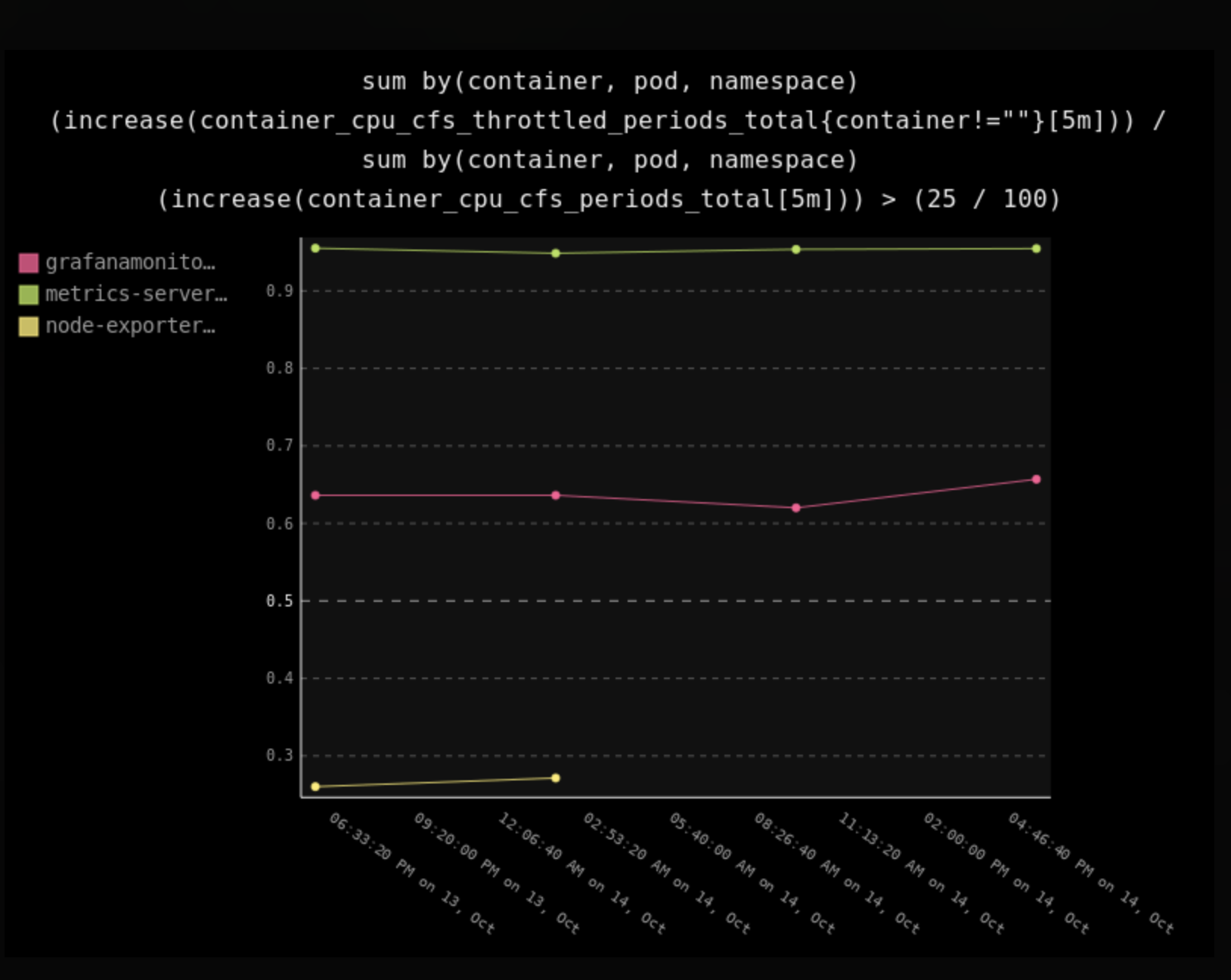
This action can be run automatically.
Add this to your Robusta configuration (values.yaml when installing with Helm):
actions:
- cpu_throttling_analysis_enricher: {}
triggers:
- on_pod_all_changes: {}
The above is an example. Try customizing the trigger and parameters.
No action parameters
on_pod_create
on_pod_all_changes
on_pod_delete
on_prometheus_alert
on_pod_update
This action can be manually triggered using the Robusta CLI:
robusta playbooks trigger cpu_throttling_analysis_enricher name=POD_NAME namespace=POD_NAMESPACE
Image pull backoff reporter¶
Playbook Action
This action can be run automatically.
Add this to your Robusta configuration (values.yaml when installing with Helm):
actions:
- image_pull_backoff_reporter: {}
triggers:
- on_pod_all_changes: {}
The above is an example. Try customizing the trigger and parameters.
- rate_limit (int) = 3600
Rate limit the execution of this action (Seconds).
on_pod_create
on_pod_all_changes
on_pod_delete
on_prometheus_alert
on_pod_update
This action can be manually triggered using the Robusta CLI:
robusta playbooks trigger image_pull_backoff_reporter name=POD_NAME namespace=POD_NAMESPACE
Pod events enricher¶
Playbook Action
This action can be run automatically.
Add this to your Robusta configuration (values.yaml when installing with Helm):
actions:
- pod_events_enricher: {}
triggers:
- on_pod_all_changes: {}
The above is an example. Try customizing the trigger and parameters.
No action parameters
on_pod_create
on_pod_all_changes
on_pod_delete
on_prometheus_alert
on_pod_update
This action can be manually triggered using the Robusta CLI:
robusta playbooks trigger pod_events_enricher name=POD_NAME namespace=POD_NAMESPACE
Daemonset Enrichers¶
Daemonset status enricher¶
Playbook Action
Enrich the finding with daemon set stats.
Includes recommendations for the identified cause.
This action can be run automatically.
Add this to your Robusta configuration (values.yaml when installing with Helm):
actions:
- daemonset_status_enricher: {}
triggers:
- on_daemonset_update: {}
The above is an example. Try customizing the trigger and parameters.
No action parameters
on_daemonset_delete
on_daemonset_create
on_prometheus_alert
on_daemonset_update
on_daemonset_all_changes
This action can be manually triggered using the Robusta CLI:
robusta playbooks trigger daemonset_status_enricher name=DAEMONSET_NAME namespace=DAEMONSET_NAMESPACE
Daemonset misscheduled analysis enricher¶
Playbook Action
Enrich the alert finding with analysis and possible causes for the misscheduling, if the cause is identified.
<https://blog.florentdelannoy.com/blog/2020/kube-daemonset-misscheduled/|Learn more>
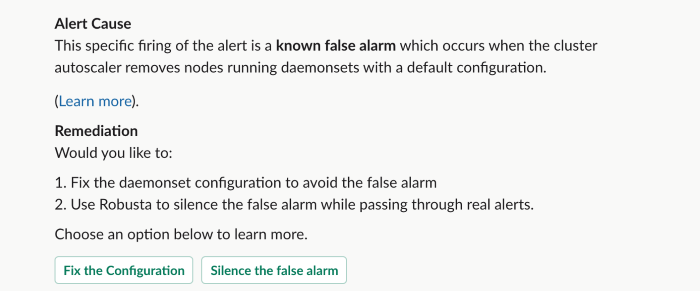
This action can be run automatically.
Add this to your Robusta configuration (values.yaml when installing with Helm):
actions:
- daemonset_misscheduled_analysis_enricher: {}
triggers:
- on_daemonset_update: {}
The above is an example. Try customizing the trigger and parameters.
No action parameters
on_daemonset_delete
on_daemonset_create
on_prometheus_alert
on_daemonset_update
on_daemonset_all_changes
This action can be manually triggered using the Robusta CLI:
robusta playbooks trigger daemonset_misscheduled_analysis_enricher name=DAEMONSET_NAME namespace=DAEMONSET_NAMESPACE
Deployment Enrichers¶
Deployment status enricher¶
Playbook Action
Enrich the finding with deployment status conditions.
Usually these conditions can provide important information regarding possible issues.

This action can be run automatically.
Add this to your Robusta configuration (values.yaml when installing with Helm):
actions:
- deployment_status_enricher: {}
triggers:
- on_deployment_update: {}
The above is an example. Try customizing the trigger and parameters.
No action parameters
on_deployment_create
on_prometheus_alert
on_deployment_delete
on_deployment_all_changes
on_deployment_update
This action can be manually triggered using the Robusta CLI:
robusta playbooks trigger deployment_status_enricher name=DEPLOYMENT_NAME namespace=DEPLOYMENT_NAMESPACE
Other Enrichers¶
Stack overflow enricher¶
Playbook Action
Enrich the alert finding with a button, which clicking it will show the top StackOverflow search results on this alert name.

This action can be run automatically.
Add this to your Robusta configuration (values.yaml when installing with Helm):
actions:
- stack_overflow_enricher: {}
triggers:
- on_prometheus_alert: {}
The above is an example. Try customizing the trigger and parameters.
No action parameters
on_prometheus_alert
Show stackoverflow search¶
Playbook Action
Add a finding with StackOverflow top results for the specified search term. This action can be used together with the stack_overflow_enricher.
This action can be run automatically.
Add this to your Robusta configuration (values.yaml when installing with Helm):
actions:
- show_stackoverflow_search:
search_term: string
triggers:
- on_pod_create: {}
The above is an example. Try customizing the trigger and parameters.
- search_term (str)
StackOverflow search term
Any trigger
This action can be manually triggered using the Robusta CLI:
robusta playbooks trigger show_stackoverflow_search search_term=SEARCH_TERM
Available Silencers¶
Severity silencer¶
Playbook Action
Silence alert findings with with the specified severity level.
This action can be run automatically.
Add this to your Robusta configuration (values.yaml when installing with Helm):
actions:
- severity_silencer:
severity: warning
triggers:
- on_prometheus_alert: {}
The above is an example. Try customizing the trigger and parameters.
- severity (str) = none
severity level that should be silenced.
on_prometheus_alert
Name silencer¶
Playbook Action
Silence named alerts.
This action can be run automatically.
Add this to your Robusta configuration (values.yaml when installing with Helm):
actions:
- name_silencer:
names:
- string
- string
triggers:
- on_prometheus_alert: {}
The above is an example. Try customizing the trigger and parameters.
- names (str list)
List of alert names that should be silenced.
on_prometheus_alert
Node restart silencer¶
Playbook Action
Silence alert findings for pods, that are on a node that was recently restarted.
This action can be run automatically.
Add this to your Robusta configuration (values.yaml when installing with Helm):
actions:
- node_restart_silencer: {}
triggers:
- on_prometheus_alert: {}
The above is an example. Try customizing the trigger and parameters.
- post_restart_silence (int) = 300
Period after restart to silence alerts. Seconds.
on_prometheus_alert
Daemonset misscheduled smart silencer¶
Playbook Action
Silence daemonset misscheduled alert finding if it's a known false alarm.
checks if the issue issue described here: https://blog.florentdelannoy.com/blog/2020/kube-daemonset-misscheduled/
This action can be run automatically.
Add this to your Robusta configuration (values.yaml when installing with Helm):
actions:
- daemonset_misscheduled_smart_silencer: {}
triggers:
- on_prometheus_alert: {}
The above is an example. Try customizing the trigger and parameters.
No action parameters
on_prometheus_alert
